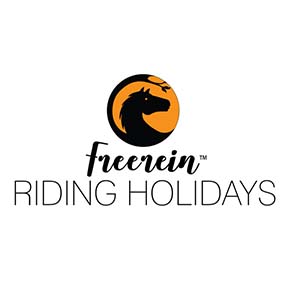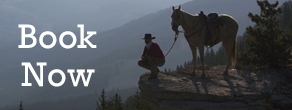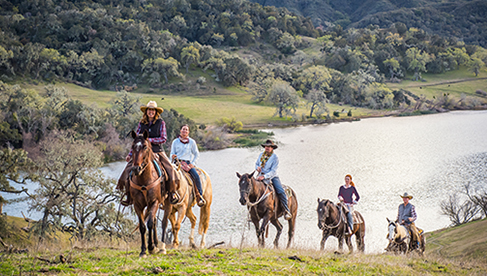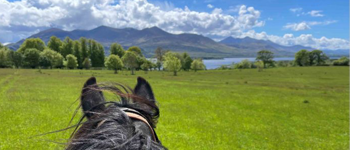Donna Barton Brothers, Former Top Jockey Still Rules in the Sport of Kings
Donna Barton Brothers, a 2nd generation top jockey, daughter of Patti Barton and equestrian media personality shares moments from her career in horseracing.
by Raina Paucar
Donna Barton Brothers is the daughter of one of the first pioneering woman jockeys in America, Patti Barton. Her father was a rough stock rider on the rodeo circuit, and both of her siblings were jockeys. Both mother and daughter have won over 1,000 races. Donna now covers major horseracing and equestrian events for televised broadcasting. She shares with us the history of her equestrian family, her racing career as top jockey and how everything has come together in her current profession.

Donna Barton Brothers
Raina Paucar for Equitrekking: How did you become involved with horses?
Donna Barton Brothers: My mother was a trick rider and exhibition bull rider on the rodeo circuit long before I was born. My father rode bare back and saddle broncs as well, so horses were in my genetics. I can’t remember the first time I rode a horse, I’ve just always ridden.
Equitrekking: What inspired you to start your career as a jockey?
Donna Barton Brothers: Oddly enough, I rode my first race to eliminate being a jockey as a career option. My mother, brother and sister were all jockeys and all had retired from riding before I rode my first race. I was 21 years old and had been galloping horses at the track for 4 1/2 years. I was in Birmingham, Alabama (this was 1987 in the inaugural season of the now defunct Birmingham Turf Club) and a friend of our family’s called me. He wanted me to come to Kentucky and train his horses. Simultaneously, there was an agent at Birmingham who had been urging me to start riding professionally. He had my brother’s book at one time. In any event, I told Pete (the agent) that if he could get me on a horse I’d ride it. Two weeks later, I rode my first race and was fascinated with how challenging and thrilling it was! I had watched thousands of races up to this point. My whole family had ridden races, but nothing prepared me for how fast everything happens in a race; speed and thrill of racing in a pack of race horses. I was in love.
Equitrekking: Was your mother supportive of your decision to ride?
Donna Barton Brothers: My mom never encouraged nor discouraged any of us from riding, she only encouraged us to follow our hearts, and whatever you do, do it well. With that said, I could tell once I started riding professionally that she was very proud of me. She says that it wasn’t pride in me becoming a jockey that I was seeing, it was the pride that comes from a mother seeing her daughter find her passion. As she says, I now had a purpose.
Equitrekking: Can you share with us the experience of winning your first race?
Donna Barton Brothers: My first win came at Birmingham Turf Club in 1987 on a horse named Discover Acro, trained by Tony Cataldi. She (Discover Acro) came from off the pace. I still remember turning for home after passing a few of the horses in the race. Around the second turn, I saw that I only had one horse left to pass! I knew then that I was going to win, because that horse was slowing down and mine was still picking up steam. It was a huge thrill! Not only because I got my first win, but also because I got the win on one of Mr. Cataldi’s horses. He was supportive of me from Day One and instrumental in much of early development as a jockey.
Equitrekking: What was your most memorable ride?
Donna Barton Brothers: Probably my second place finish in the Breeders’ Cup Juvenile on Hennessy in 1995. I rode Hennessy for D. Wayne Lukas, who had two other horses in the race; one of which was the favorite (Honour and Glory). Hennessy wasn’t a long shot, but was something like 7 or 8 to 1, but I’d been on the other two of Wayne’s horses in the morning, and I felt like Hennessy was the best of the trio.
In any case, I loved Hennessy, because he was such a tryer. He gave everything he had to give, every time he ran for me. Yet, he was also a playboy who loved to buck and play in the mornings and in the post parade when he wasn’t tending to the business of racing. But, he was one of those horses who felt you getting off balance during his antics, would quickly and cleverly slideback under you. He didn’t want you to fall off, he just wanted to show you a good time!
So, I rode Hennessy with a tremendous amount of confidence in not only his talent, but his willingness to wait for me to ask for a run, and then he would lay it all down for me. We were second that day, beaten a neck by a very nice colt, Unbridled Song. If I had it all to do over again, I would do nothing differently, and I love how hard he tried to win, even in defeat.
Equitrekking: What is your most memorable story as a jockey?
Donna Barton Brothers: “Most memorable” is a tough one, as there are just so many stories. I can tell you a funny one though. I was riding a horse named Trick Artist at Turfway Park, in the fall of 1996 for a trainer named Joe Schutte. I had ridden him before, but Trick Artist was a little wound up in the post parade that day. So I was doing what Julie Krone termed as “the flop” on him in the post parade, which means I had my feet kicked out of the irons (which I don’t recommend most of the time!), a slump in my back; sitting heavily in the saddle, to convey a sense of “relax, it’s cool” to him.
Since I was in the “let’s all relax” mode, I had a song running through my head, but was not singing it out loud in the post parade, because I have an utterly horrible singing voice. However, as we loaded and then sat in the starting gate, the song was still coursing through my mind. When the gates sprung open, Trick Artist burst forward with an unusual amount of early speed.
Again, I was still in the “relax, we’re cool” mode, so I just eased my hands back to his withers and took a long rein trying to convey a sense of “there’s plenty of time, we’re in no hurry”. Since the song was still running through my head and we were now alone on the lead, I started singing the song out loud. It was at about this time that Trick Artist pinned his ears flat back on his head signaling something was amiss. I looked around, but no one was encroaching on his lead, so I couldn’t figure out where his discomfort was coming from.
No worries, once I looked at Trick Artist again his ears were forward, signaling that he was comfortable once again. So... I went back to singing my little song, at which time Trick Artist pinned his ears flat back again! I stopped singing. Ears up, happy horse. Started singing again (I just had to see!), ears pinned flat back. Needless to say, I stopped singing. Yes, it’s that bad. He won in wire to wire fashion, and I never sang to another horse (aloud) again.

Donna Barton Brothers on Colonial Winter at Churchill Downs, May Day 1996 / Photo by Kevin R. Morris
Equitrekking: You’ve won over 1,000 races, what was the deciding factor in your retirement?
Donna Barton Brothers: There were many factors that played a part in my decision to retire. I’ll start by saying that I was a jockey for 11 1/2 years, and I loved it for 11 of them. The last 6 months just weren’t that fun for me any more. For one, this is a game of peaks and valleys, and at the time I was in a valley. I had been in valleys before and knew what I had to do to get back to the peak, but suddenly that sort of effort seemed more like work than challenge.
Also, my boyfriend (now husband) was a horse trainer and we’d been dating for a few years. As you may know, there’s an archaic rule in horse racing stating if a jockey marries a horse trainer, then that jockey has to ride the trainer’s horse in every race they have a horse in, or sit the race out. For many years we didn’t even entertain the thought of getting married, because, while I did ride some horses for my then boyfriend, Frank Brothers, I also rode for many other top trainers. Neither of us wanted to be bound by this rule.
Add to that combination, which I think it’s true for all jockeys, that riding a race brings two predominant emotions: thrill and fear. The thrill of riding outweighs the fear that the inherit dangers of the sport are only thought of when they’re close to being actualized. Well, towards the end of my career, the knowledge that being a jockey was a very dangerous occupation began to creep into the front of my mind, rather than resting comfortably at the back where it had laid for so many years. I can honestly say that I never rode scared and I’m sure of that. But when I started thinking more and more about the possible dangers, I knew it was time to move on. I was lucky that I had somewhere else to go. I announced my retirement and my engagement to Frank Brothers at the same time.
Equitrekking: As an accomplished horsewoman, are there any changes you’d like to see in the horse racing industry?
Donna Barton Brothers: I would like to see less whipping and more horsemanship. I don’t think whips should be banned any more than I think it should be illegal for a parent to spank their child. But there’s a difference between using the whip as a reminder of expected behavior and overuse, and we see way too much overuse. I think this has been the case in horse racing for many years, but in today’s climate, it’s not as easily tolerated by the general public. They have a right to expect more from the people who are supposed to be caring for these great athletes. Do I think the whip really hurts the horses when they’re in the high-adrenaline moment of the stretch run? Probably not. But I don’t think it helps them much either and I think it looks bad.

Donna getting ready to interview jockey Calvin Borel after winning the 2009 Kentucky Derby
Equitrekking: How do you feel being a successful jockey has contributed to your broadcasting career?
Donna Barton Brothers: Being a successful jockey has helped me to gain respect from my peers that can only be earned over time. It also helps me to know most of the answers before I even ask the question and then ask the question in a respectful manner, mindful of all the circumstances involved.
Equitrekking: Do you have any regrets in your racing career?
Donna Barton Brothers: No regrets. I’m proud of what I accomplished and how I went about it. That said, if I had it to do over again, I would work smarter, rather than harder. There was no one who worked harder than me. For most of the years I rode and at most of the tracks, I was at the track 7 days a week making rounds before the track even opened. Looking back, I could’ve worked smarter by getting to know the owners better and using the media to my advantage, rather than seeing them as a nuisance at times!
Equitrekking: What are some challenges you faced as a female jockey?
Donna Barton Brothers: The challenges that a jockey faces are gender blind. Hard work, long hours, taking care of your body as if you’re the paid professional athlete that you are, and realizing that this is a lifestyle not a job or even a mere career. I never saw being female as a handicap, in fact, there may’ve been times when it worked to my advantage. When I would go to a new track people might watch me ride when they wouldn’t necessarily watch Joe Blow ride. They just had to see, with their own eyes, this girl who people said rode like a man. I cannot say that I met any discriminations that men did not also face. Some people won’t ride Spanish-speaking jockeys or African Americans or jockeys who are “too short” or “too tall”... Until that guy is winning all the races, that is! It’s easy to find reasons to fail, the trick is to see beyond any doubts that others may see in you.
I will say that as a female athlete I probably had to work much harder than men on gaining the necessary muscle to be a top level jockey. I learned through much research in health and nutrition that a man’s body can figure out a way to make muscle out of a Twinkie, while a woman’s body will find a way to make fat out a chicken breast and lettuce! It took me some time to build the strength I needed to compete at the top level, but once my body caught on to the program, I learned why muscle memory is such a magical thing.
Equitrekking: Do you feel female jockeys still have difficulty in getting live mounts?
Donna Barton Brothers: My mother was one of the first half dozen women to be licensed as a jockey, that was in 1969. By 1970, she was leading rider at Waterford Park (now Mountaineer Racino). Leading Rider! Not leading female rider, leading rider. She taught me that hard work and determination can overcome many obstacles. I grew up in an environment where I knew nothing about male chauvenism, because she never mentioned it. Meanwhile, she knew all about it and flipped it off! I think top jockeys can get mounts on top horses; Rosie Napravnik, Emma Jayne Wilson, Rosemary Homeister, Jr. Sub-par jockeys do not get good mounts. If a jockey is having trouble getting mounts, they may wish to look at what they need to do differently, rather than look for someone or something to blame.
Equitrekking: What advice you can give to girls aspiring to become jockeys?
Donna Barton Brothers: Know that men’s and women’s bodies are different. Unless you’re just genetically gifted, you’ll have to work hard to gain the same muscle mass that men have almost naturally. Do the work you need to do to be as strong as the men with whom you’re competing. This will take spending time in the gym, lifting weights and most likely running to build cardio fitness and endurance. Watch your films (race replays) and make sure you don’t “look like a girl” on a horse in a race. No one wants the best girl jockey they can get, they want the best jockey they can get. Be that.
To learn more about Donna's insights on horseracing, you can read her book, "Inside Track: Insider’s Guide to Horse Racing."
Connect with Donna on her Website, DonnaBrothers.com, Twitter @donnabbrothers and Facebook




